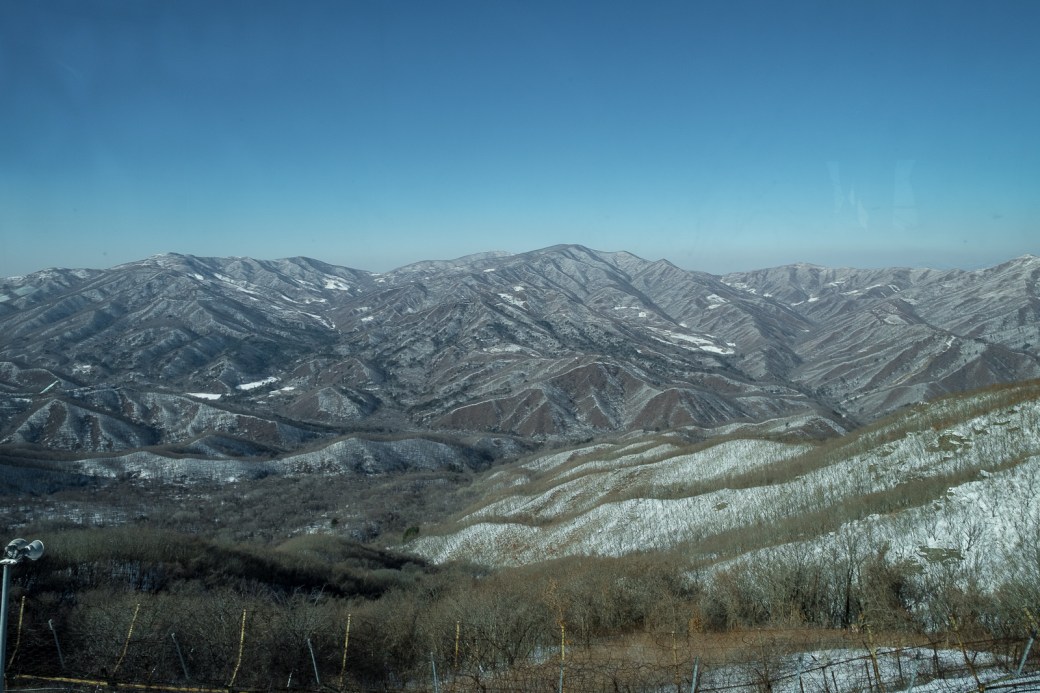
One cold, late January afternoon, we sped from Seoul across South Korea to Sokcho city. It’s a two hour journey, once past the spider’s web of highways that weaves among the 25 million inhabitants of the capital. In countless towers, people reach for the sky. From a distance, once humans become implied rather than visible, the effect is of calm white teeth, a dental display of high density housing. I was mesmerised.
I had very little expectation about South Korea. Neither negative or positive. A far country, stuck on to China, close to Japan, with a troubled history of occupying neighbours and war with its northern self in living memory. Technological powerhouse, one time Olympic host and purveyor of Kimchi, which I’d tried at various Korean restaurants: I had a residual speckle of understanding for the country. Without ever having been there, I suppose I anticipated one big, grey company town.
How wrong. South Korea is beautiful.
It is also impressive, mountainous, architecturally neat and, in sparkling January sun, easy to love. In the four days we were there, talking with a remarkable couple and their friends, I loved it very much.
In a perfectly round valley, known as the Punchbowl, up next to the border with North Korea and the De-Militarised Zone, are 20 hectares of land currently known as ‘The Apple Project’. Here, a Mr and Mrs Kim are embarking on the next stage of their working lives.
The Kims ran a school in Seoul for over 30 years. Since moving on, they have employed the world’s leading authority on apples. This is no idle boast. We learned in moments that there is nothing Mr Son doesn’t know about apples. The Kims have also employed an exceptional garden designer and advisor. Kyungah’s seventh book was published in the time we were there. She lectures and broadcasts constantly. She spent six years in the UK obtaining a doctorate. Her early career was writing television. She also has time to paint, design and photograph to exacting standards, besides fitting in a family life which has produced two bilingual daughters, one a fully qualified doctor, the other en route for the UN. She knew more about any single famous British garden than anyone I’ve met, but her knowledge extends to Europe, the US and pretty much anywhere else.
Apples change hands in Korea for up to £7. That’s not per pound or kilo, that’s seven English pounds each – 0r 10,000 Won in the local currency.
We didn’t drink the Kool-Aid (our hosts were politely, but not Calvinistically, abstemious). Nevertheless over four extraordinary days, I amassed enough evidence and personal experience to become convinced the Kims are in danger of producing the best apples on earth. Very rarely could I ever say that about clients I have worked with. We tasted the fruit from neighbouring approximations of the orchards they planted just over a year ago both blind and side-by-side. We listened carefully to Mr Son, via a translator, on his specialist subject discovering, besides a phenomenal knowledge of apples, a deep and gentle humour. The Kims themselves are reacting to years of the working ethic that has accompanied South Korea’s economic miracle. 17 hour days, six day weeks and obsessive over-achievement have dominated South Korean working practice since the war with the North. The Kims want to create a business that leaves a more balanced legacy for subsequent generations. The Apple Project will become a destination where the young can go and live for extended periods. Work Life balance is much discussed. Positive business ethics, sustainability, environmental probity and a do-as-you-would-be-done-by approach are so evidently stitched in to the enterprise, it is humbling.
At Big Fish, our job is to help them name, brand and design the Apple Project. It’s a hell of a responsibility but it is also an exciting privilege. We’re mid-way through.
On our first full day in the secret kingdom tucked over on the border on the eastern side of the country, we drove up to an observation post and looked in to North Korea.

The crenelated contours appear more folded hearth rug than home to the most repressive regime imaginable. Looking closely, there were buildings and roads in view (the centre of the image above), but not a hint of humanity. The South Korean border guards told us that we were looking at one of the most heavily mined landscapes anywhere, but also that the electric fences the North have erected are no longer electrified as the power to arm them is simply not being generated.
We looked hard at the landscape, in theory forbidden from photographing it. In the sun, it was bleakly unreal and strangely unthreatening. Within days, Kim Jong-Un was to launch a flurry of missiles towards Japan and, according to the suspicions of journalists all over the world, kill his half brother at a Malaysian airport.
The home of paranoid belligerence stretched out before us. A mile or two behind were the peaceful saplings of Mr and Mrs Kim’s dream, growing into reality under the snow.
Sometimes the excitement, tension, hope and circumstances of a moment combine to make you more than glad to be alive.
Just incredibly, amazingly lucky.
Boy! That’s some commute.
LikeLike